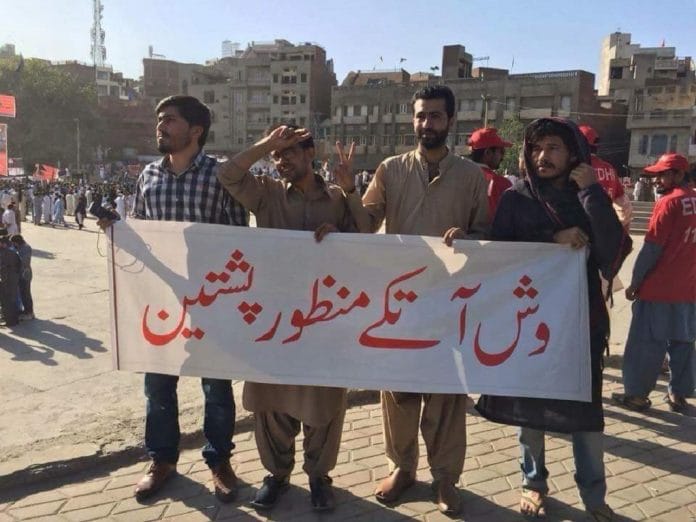The tribal community has organised itself to voice its demands after years of resistance against human rights violations. Manzoor Pashteen is leading the way.
New Delhi: Thousands of Pakistan’s Pashtuns are currently marching in Lahore as part of the Pashtun Tahafuz Movement (PTM), the result of a long protest against extrajudicial killings and human rights violations in Balochistan and the Federally Administrated Tribal Areas (FATA).
The march began Sunday from Lahore’s landmark Mochi Gate, and symbolises the PTM’s defiance of the Pakistani government’s decision to impose a ban on its rally. The PTM is also protesting the arrests of some of its members.
The nub of the problem
The Pashtuns, a tribal community inhabiting the Khyber Pakhtunkhwa province, FATA, and the northern part of the Balochistan province, have increasingly been at loggerheads with the government since 9/11, when the tribal areas of Waziristan became the frontline for the ‘war on terror’, leaving the Pashtuns vulnerable to militant attacks and army crackdowns.
The turning point in the Pashtun resistance came when shopkeeper and model Naqeebullah Mehsud died in an extrajudicial killing on 13 January. Mehsud was charged with militancy and links with the Lashkar-e-Jhangvi and the Islamic State by senior superintendent of police Rao Anwar, who allegedly carried out the encounter. An inquiry was set up to investigate the killing; it found that Mehsud was innocent and killed in a fake encounter.
Since then, many marches have been carried out by Pashtuns all across Pakistan as a part of the ‘Pashtun long march’.
Gaining momentum
The movement is now being spearheaded by Manzoor Pashteen, a young human rights activist from Waziristan, who has become the face of the PTM through his active mobilisation of followers on social media and during rallies.
During the Lahore protest, Pashteen pointed out: “Pakistan’s constitution says that if anyone has committed a crime, arrest them and bring them before the courts within 24 hours. But thousands of Pashtuns have been killed extrajudicially. They want to be able to continue to make people disappear, to kill them extrajudicially, to establish their own rule rather than that of the constitution.”
Pashteen also took to social media and asked the protesters not to be discouraged, and to continue to protest peacefully.
At a rally in Peshawar on 8 April, Pashteen had directly addressed the Pakistani government and the army, condemning them for promoting violence in the FATA region. He laid out the demands of the Pashtuns, which included the release of missing persons as well as insurance of basic human rights for the Pashtuns. “We will go to every village until our demands are met,” he had announced.
Media blackout
Although the protests have been spreading across Pakistan since January, the Pakistani media has been largely silent, leading some to label it a deliberate ‘blackout’. None of the national dailies, for example, have seriously reported on the marches.
Pashteen questioned this blackout in Sunday’s rally, asking: “Right now, why are there restrictions on the media? Why are their lips sealed?”
Pashteen also announced that the next PTM rally would take place in Karachi on 12 May.






